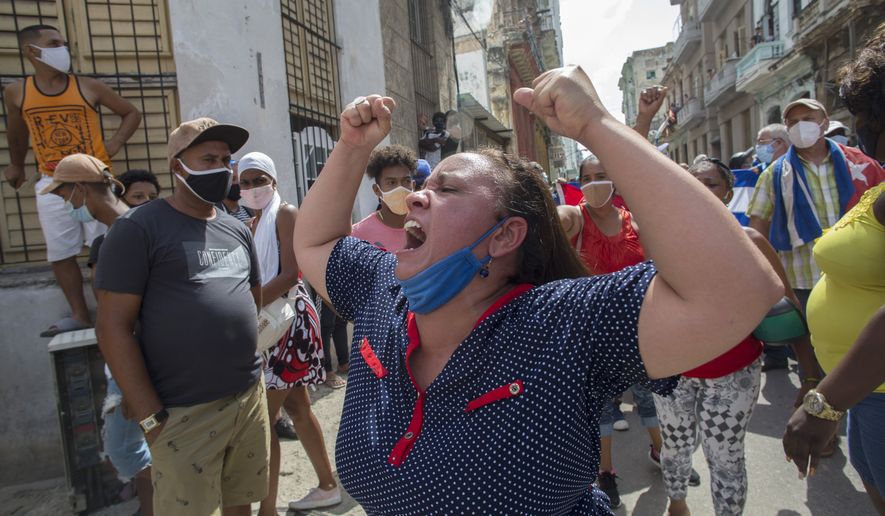Lawmakers on a House Foreign Affairs subcommittee called for U.S. support to the Cuban people in the first congressional hearing on the communist government’s crackdown on protesters who began taking to the street just over a week ago.
The hearing follows President Biden’s creation of a State Department working group to review U.S. remittance policy to ensure the Cuban regime does not skim from money Cuban Americans send to family members on the island.
“What we have witnessed over the last week in Cuba is nothing short of historic. Cubans have taken to the streets by the thousands to call for freedom and democracy,” said Rep. Albio Sires, New Jersey Democrat and chairman of the House Foreign Affairs subcommittee on the Western Hemisphere. “They have been clear in demanding an end to the dictatorship.”
Mr. Sires said the Biden administration should consider such concrete measures in the near term as working to restore and expand internet access in Cuba, which the Cuban government, aided by Chinese technology, has restricted following the protests.
Panel lawmakers also called for identifying and sanctioning human rights abuse perpetrators within the Cuban government.
They said the protests in Cuba marked a pivotal point in history, and signal a growing resistance to the communist government that has been in power for more than 60 years.
“Last Sunday was a momentous and inspirational day,” said Rep. Mark Green, Tennessee Republican. “Tens of thousands of Cubans all throughout the country took to the streets demanding freedom from the communist dictatorship. Some even waved the American flag as they demanded ‘Libertad.’”
Rep. Michael T. McCaul of Texas, the top Republican on the committee, called the demonstrations “a pivotal point in history” and said “it is a moment in time and we need to take advantage of it
But not all committee members were aligned on all proposals.
Most divisive was the suggestion by Jose Miguel Vivanco, Human Rights Watch executive director and a witness at Tuesday’s hearing, that Congress and the White House to dismantle the embargo and isolation policy, which he said have been detrimental for Cubans.
“Rather than isolate Cuba, the policy has isolated the United States,” he said.
Mr. Green objected to the recommendation, saying the Cubans taking the streets are not protesting the embargo.
Rosa Maria Paya Acevedo, director of Cuba Decide, an organization that advocates for pro-democracy policies for Cuba, echoed Mr. Green’s sentiments.
“They were not asking for the end of the embargo,” she said. “They were asking for the end of the dictatorship. The end of the dictatorship is a demand of the Cuban people. That’s the demand alone, and that’s the demand we need solidarity to.”
Mr. Green argued that lifting the embargo would embolden the dictatorship.
“This insane notion that lifting the embargo is going to somehow provide freedom for the Cuban people is crazy. It’s absurd. And the only reason you would say that is unless you are trying to hide behind socialism and communism as an effective model. But everywhere else in the world it’s been disproved.”
Ms. Paya Acevedo echoed calls for sanctions on Cuban officials and expanding internet access to Cubans. She also called for partnership with European and Latin American countries to apply pressure on the Cuban government.
“It is a moral imperative to stop the regime abuses after 62 years of crimes against humanity perpetrated by a military dictatorship that has never been held accountable,” she said.
• Joseph Clark can be reached at jclark@washingtontimes.com.




Please read our comment policy before commenting.